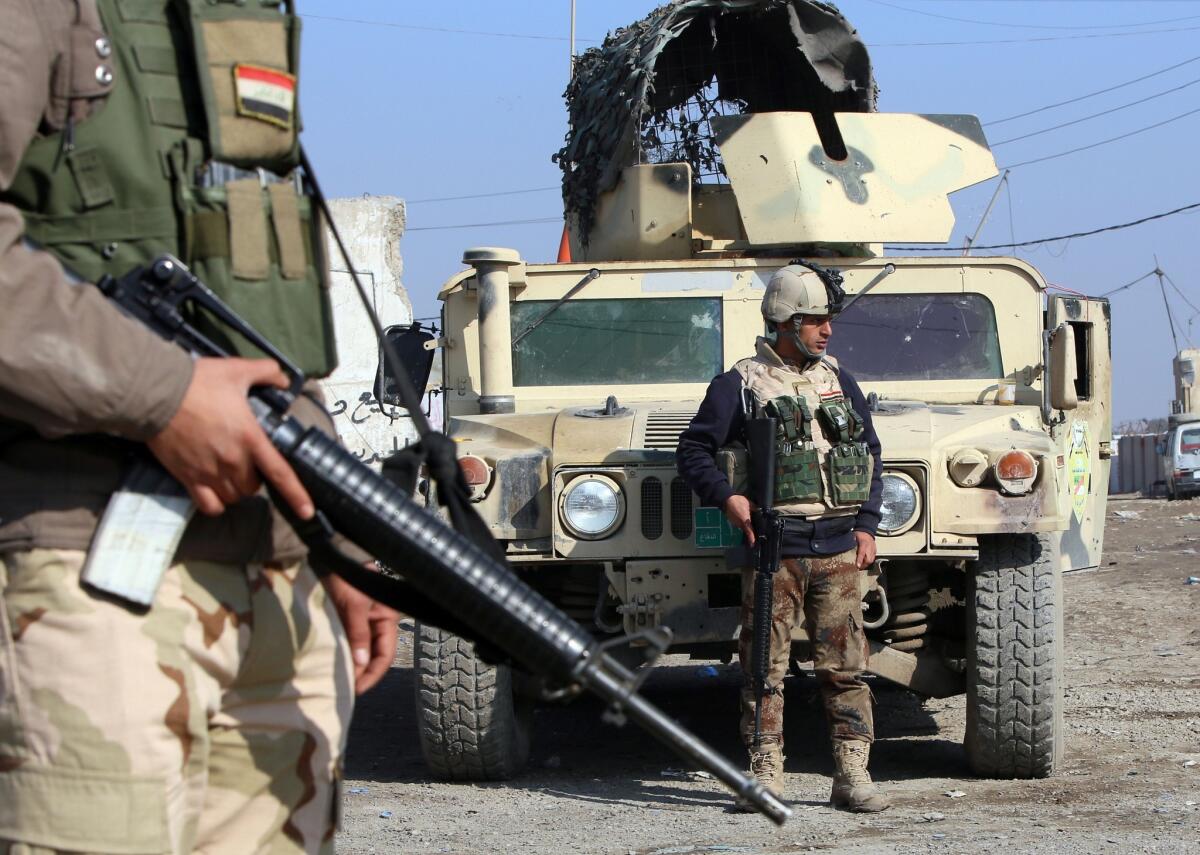Maliki calls on Iraqis to expel Al Qaeda from Anbar or face attack

- Share via
Iraqi Prime Minister Nouri Maliki urged the residents of Fallouja to expel Al Qaeda-aligned militants who seized the city last week or deal with an imminent attack by government forces to regain the Sunni Muslim stronghold, news agencies in Baghdad reported Monday.
Although the statement issued by Maliki on his Shiite-led government’s website appealed for troops to avoid striking civilian areas, it warned of the risks of a military onslaught and armed clash with the Sunni warriors of the Al Qaeda-affiliated Islamic State of Iraq and Syria, or ISIS.
“The prime minister appeals to the tribes and people of Fallouja to expel the terrorists from the city in order to spare themselves the risk of armed clashes,” Reuters news agency quoted from the statement posted in Arabic.
Agence France-Presse reported that an unnamed government official had said civilians in Fallouja would be given time to leave the city before an offensive.
Civilians were reportedly fleeing in droves from Fallouja, a city of 300,000 that witnessed some of the worst violence of the 2003-2011 U.S. occupation of Iraq when Al Qaeda-backed militants sought to drive out the foreign forces.
Many of the foreign insurgents were captured and imprisoned since the U.S. exodus two years ago, but in July fighters with the ISIS staged brazen attacks on two prisons outside Baghdad, freeing more than 500 fighters, bolstering the militant Sunni forces in the hotbed of sectarian tension along the Euphrates River.
ISIS has gained sway in Fallouja and Ramadi, the nearby capital of Anbar province, as the fighters have sought to shield the local Sunni population from reprisals by the Shiite-dominated government in Baghdad. Iraqi security forces on Dec. 28 arrested a local Sunni lawmaker accused of terrorism and two days later cleared a Sunni protest camp, angering the Islamic sect that is a minority in the country but a majority in vast but sparsely populated Anbar.
Sectarian violence has plagued Anbar since April, when the government began cracking down on antigovernment protesters who alleged that Sunnis were being excluded from public offices and positions of power. Last year’s death toll in Iraq from Sunni versus Shiite fighting was at least 8,868, the United Nations reported last week, the worst since 2007 when Al Qaeda militants clashed with U.S.-led coalition forces in the area.
U.S. Secretary of State John F. Kerry, who is on a Middle East tour to shore up Israeli-Palestinian peace talks, said in Jerusalem over the weekend that he was “very, very concerned” about the flaring violence in Anbar. He said the United States would send aid and offer advice to the Iraqi government but wouldn’t be sending in troops.
“This is a fight that belongs to the Iraqis,” Kerry said at a news conference Sunday, upholding the Obama administration’s objective of disengaging U.S. forces from Iraq and Afghanistan and resisting pressures to deploy them to other faraway conflicts.
A senior Iranian military official also offered noncombat assistance to Iraq’s leadership in containing the “terrorist” threat in Anbar. Deputy chief of staff Gen. Mohammad Hejazi was quoted by the Islamic Republic News Agency as saying Tehran was ready to provide “equipment and advice” if its allies in Baghdad asked for aid.
Although Iran and Iraq fought a bitter war for eight years in the 1980s, the two Shiite-ruled countries have developed closer ties since the U.S. withdrawal from Iraq at the end of 2011.
The Syrian civil war and increasingly the Sunni-Shiite violence gripping Iraq are widely seen as proxy battles between Saudi Arabia and Iran as the respective Sunni and Shiite powers maneuver for dominance in the region.
In Syria, the ISIS has gained control of key areas in the predominantly Sunni quest to depose President Bashar Assad, whose government is composed mostly of Alawites, a Shiite-affiliated sect.
The rising clout of the Al Qaeda faction has spurred massive infighting among the disparate rebels in recent weeks, with intense fighting reported Monday around Raqqah, the first Syrian city to fall completely to the rebels when they seized power 10 months ago.
Twitter: @cjwilliamslat
More to Read
Sign up for Essential California
The most important California stories and recommendations in your inbox every morning.
You may occasionally receive promotional content from the Los Angeles Times.











